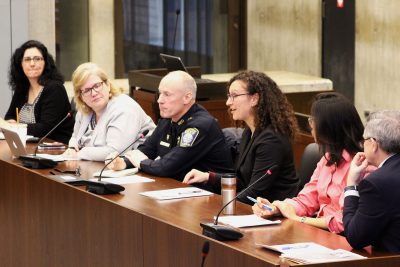
The Boston City Council Committee on Homelessness, Mental Health and Recovery held a public hearing Monday morning to address suicide prevention.
The hearing consisted of three panels with representatives from various health organizations and a portion for public testimony. The panels addressed suicide and mental health from the perspective of public school students, college students, individuals affected by homelessness, LGBTQ individuals and veterans, with regard to race, age and gender.
Essaibi-George, chair of the committee, began the hearing by saying that untreated mental illness is a significant factor in the increasing suicide rate in the United States.
“Mental illness does not discriminate,” Essaibi-George said. “It can affect anyone, from any background and any income level.”
However, Essaibi-George said research shows some groups are more vulnerable than others. Suicide is the second leading cause of death among college students, she said, and rates of suicide and mental illness are much higher among LGBTQ people, especially those who are transgender, homeless, veterans or are racial minorities.
John Bradley, chief of psychiatry and mental health service deputy director at the Veterans Affairs Boston Healthcare System, said during the first panel that there are many factors contributing to suicide rates among veterans, but that they are most highly correlated with access to firearms.
Bradley also said suicide rates in Massachusetts are lower than the national average, both among veterans and non-veterans.
Michael Stratton, a deputy superintendent in the Boston Police Department, proposed a new unit of officers whose sole purpose would be to provide outreach to Boston communities.
“They won’t be tied to the radio system,” Stratton said in the first panel. “Their role will be to go into the communities and talk with people, try to convince people to seek the services and the help they need.”
Community members also gave testimonies about their experiences dealing with mental illness and suicide.
Brandy Fluker Oakley, executive director of Educators for Excellence Boston, said during the hearing that there are two types of students who suffer from mental illness: those who express it outwardly and those who put up a facade. She shared her story of falling into the latter category and “falling through the cracks.”
“Outsiders believed that I was thriving,” said Oakley. “However, that was not the case internally. My thoughts towards myself and other life happenstances were chipping away at me.”
Oakley said that the experience taught her the importance of having strong relationships. It was through the relationships she had built, she said, that she was able to confide in someone about considering suicide and get help.
David O’Leary, chair of the Boston chapter of the American Foundation for Suicide Prevention, who spoke in the third panel, said that it is important to normalize mental health discussions.
“Normalizing this conversation which, for so long, has been something that many people were reluctant to talk about, is, we believe, one of the first steps that we can take to finding people who are struggling and saving lives,” he said.
O’Leary said asking someone directly about their mental health and thoughts of suicide will not give them the idea or talk them into suicide but will instead open a dialogue.
“If you’re watching this, just ask,” O’Leary said, addressing viewers of the live broadcast of the hearing.






















































































































